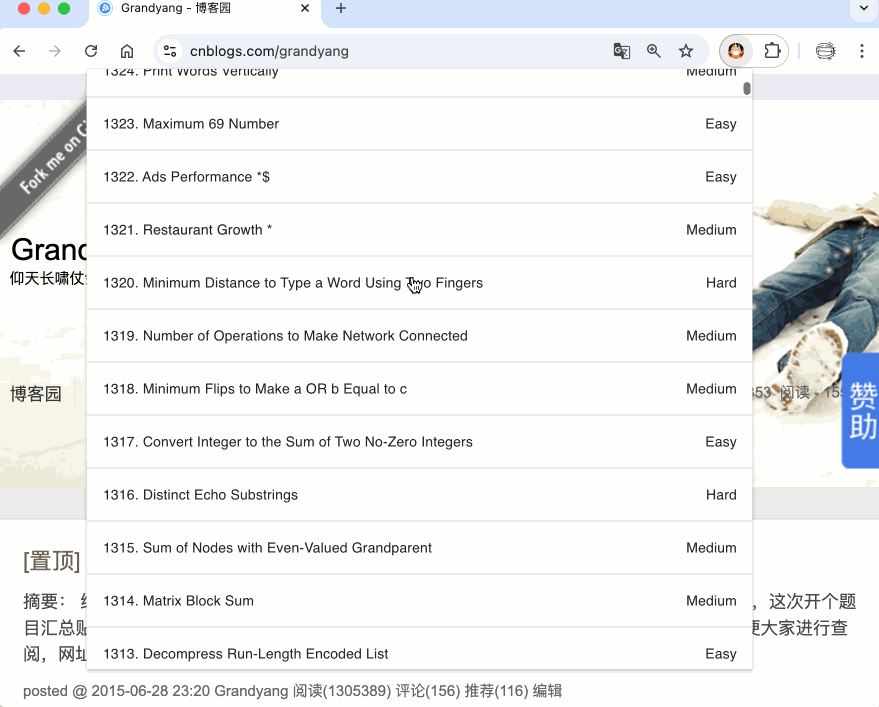[LeetCode] 1352. Product of the Last K Numbers 最后 K 个数的乘积
Design an algorithm that accepts a stream of integers and retrieves the product of the last k integers of the stream.
Implement the ProductOfNumbers class:
ProductOfNumbers()Initializes the object with an empty stream.void add(int num)Appends the integernumto the stream.int getProduct(int k)Returns the product of the lastknumbers in the current list. You can assume that always the current list has at leastknumbers.
The test cases are generated so that, at any time, the product of any contiguous sequence of numbers will fit into a single 32-bit integer without overflowing.
Example:
Input
["ProductOfNumbers","add","add","add","add","add","getProduct","getProduct","getProduct","add","getProduct"]
[[],[3],[0],[2],[5],[4],[2],[3],[4],[8],[2]]
Output
[null,null,null,null,null,null,20,40,0,null,32]
Explanation
ProductOfNumbers productOfNumbers = new ProductOfNumbers();
productOfNumbers.add(3); // [3]
productOfNumbers.add(0); // [3,0]
productOfNumbers.add(2); // [3,0,2]
productOfNumbers.add(5); // [3,0,2,5]
productOfNumbers.add(4); // [3,0,2,5,4]
productOfNumbers.getProduct(2); // return 20. The product of the last 2 numbers is 5 * 4 = 20
productOfNumbers.getProduct(3); // return 40. The product of the last 3 numbers is 2 * 5 * 4 = 40
productOfNumbers.getProduct(4); // return 0. The product of the last 4 numbers is 0 * 2 * 5 * 4 = 0
productOfNumbers.add(8); // [3,0,2,5,4,8]
productOfNumbers.getProduct(2); // return 32. The product of the last 2 numbers is 4 * 8 = 32
Constraints:
0 <= num <= 1001 <= k <= 4 * 104- At most
4 * 104calls will be made toaddandgetProduct. - The product of the stream at any point in time will fit in a 32-bit integer.
这道题给了一个数据流,让返回最后k个数字的乘积,这里博主也尝试了最简单粗暴的解法,居然没有超时,可以通过。使用一个数组 data 来记录数据流,当调用 add 函数时,将数字加入 data 中。在 getProduct 函数中,遍历末尾k个数字,将它们乘起来返回即可,参见代码如下:
解法一:
class ProductOfNumbers {
public:
ProductOfNumbers() {}
void add(int num) {
data.push_back(num);
}
int getProduct(int k) {
int n = data.size(), res = 1;
for (int i = 0; i < k; ++i) {
res *= data[n - 1 - i];
}
return res;
}
private:
vector<int> data;
};
我们也可以在上面的解法上稍微做一些优化,这里的优化思路就是快速判断若数组末尾k个数字中有0存在的话,就马上返回0,而不用再计算k个数字的乘积。这里需要记录数组中所有0出现的位置,这里使用另外一个数组 zeros 来记录所有0的位置,在 add 函数中,判断若 num 为0,则用当前 data 数组的大小来当作0的位置,加入到 zeros 数组中,然后还是要将 num 加入到 data 中。在 getProduct 函数中,首先判断末尾k个数字中是否有0,最有可能出现在末尾k个数字中的0就是 zeros 数组中的最后一个位置,判断方法是用 zeros 数组的最后一个数组(若存在的话)和 n - k 相比较,若其大于等于 n - k,直接返回0。否则还是老老实实的将末尾k个数字相乘吧,参见代码如下:
解法二:
class ProductOfNumbers {
public:
ProductOfNumbers() {}
void add(int num) {
if (num == 0) {
zeros.push_back(data.size());
}
data.push_back(num);
}
int getProduct(int k) {
int n = data.size(), res = 1;
if (zeros.size() != 0 && zeros.back() >= n - k) return 0;
for (int i = 0; i < k; ++i) {
res *= data[n - 1 - i];
}
return res;
}
private:
vector<int> data, zeros;
};
再来看一种极大优化运行时间的解法,这里创建一个累加积数组 prod,其中 prod[i] 表示末尾 n-i 个数字的乘积,则末尾k个数字的乘积为 prod[n-k]。更新 prod 数组的方法是,每当进来一个数字 num 时,prod 数组新加一个1,然后对此时 prod 数组中每个数字都乘以 num,做个小优化,当 num 为1时,不需要乘,最后返回 prod[n-k] 即可,参见代码如下:
解法三:
class ProductOfNumbers {
public:
ProductOfNumbers() {}
void add(int num) {
prod.push_back(1);
if (num == 1) return;
for (int &a : prod) a *= num;
}
int getProduct(int k) {
return prod[(int)prod.size() - k];
}
private:
vector<int> prod;
};
Github 同步地址:
https://github.com/grandyang/leetcode/issues/1352
参考资料:
https://leetcode.com/problems/product-of-the-last-k-numbers/
https://leetcode.com/problems/product-of-the-last-k-numbers/solutions/510265/c-prefix-array/











【推荐】国内首个AI IDE,深度理解中文开发场景,立即下载体验Trae
【推荐】编程新体验,更懂你的AI,立即体验豆包MarsCode编程助手
【推荐】抖音旗下AI助手豆包,你的智能百科全书,全免费不限次数
【推荐】轻量又高性能的 SSH 工具 IShell:AI 加持,快人一步
· 10年+ .NET Coder 心语 ── 封装的思维:从隐藏、稳定开始理解其本质意义
· 地球OL攻略 —— 某应届生求职总结
· 提示词工程——AI应用必不可少的技术
· Open-Sora 2.0 重磅开源!
· 周边上新:园子的第一款马克杯温暖上架
2019-09-14 [LeetCode] 834. Sum of Distances in Tree 树中距离之和
2018-09-14 [LeetCode] Construct Quad Tree 建立四叉树
2017-09-14 [LeetCode] 658. Find K Closest Elements 寻找K个最近元素
2016-09-14 [LeetCode] Integer Replacement 整数替换
2015-09-14 [CareerCup] 8.9 An In-memory File System 内存文件系统